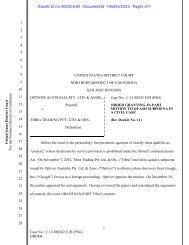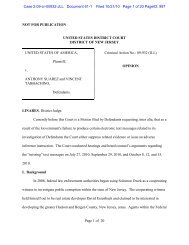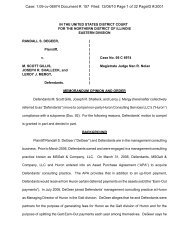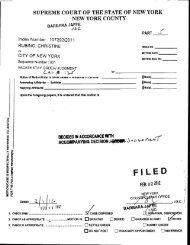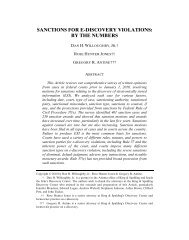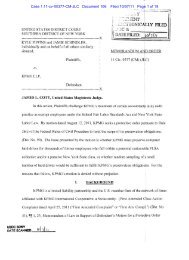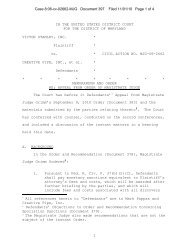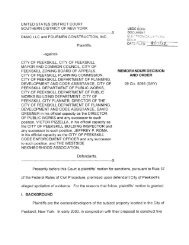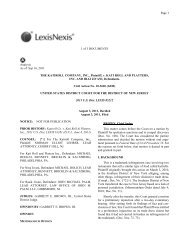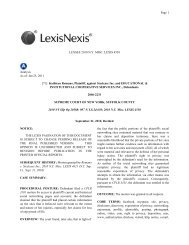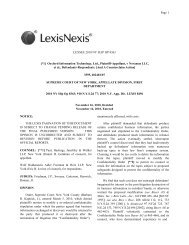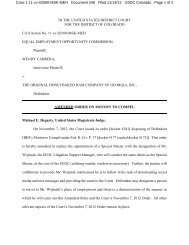Rimkus Consulting Group Inc. v. Cammarata - Ballard Spahr LLP
Rimkus Consulting Group Inc. v. Cammarata - Ballard Spahr LLP
Rimkus Consulting Group Inc. v. Cammarata - Ballard Spahr LLP
Create successful ePaper yourself
Turn your PDF publications into a flip-book with our unique Google optimized e-Paper software.
Case 4:07-cv-00405 Document 450 Filed in TXSD on 02/19/10 Page 23 of 139<br />
negligent plaintiffs that: (1) laid out the elements of spoliation; (2) instructed the jury that<br />
these plaintiffs were grossly negligent in performing discovery obligations and failed to<br />
preserve evidence after a preservation duty arose; (3) told the jury that it could presume that<br />
the lost evidence was relevant and would have been favorable to the defendant; (4) told the<br />
jury that if they declined to presume that the lost evidence was relevant or favorable, the<br />
jury’s inquiry into spoliation was over; (5) explained that if the jury did presume relevance<br />
or prejudice, it then had to decide if any of the six plaintiffs had rebutted the presumption;<br />
and (6) explained the consequences of a rebutted and an unrebutted presumption. 20 The court<br />
20<br />
The court provided the text of the charge:<br />
The Citco Defendants have argued that 2M, Hunnicutt, Coronation, the Chagnon Plaintiffs,<br />
Bombardier Trusts, and the Bombardier Foundation destroyed relevant evidence, or failed to prevent<br />
the destruction of relevant evidence. This is known as the “spoliation of evidence.”<br />
Spoliation is the destruction of evidence or the failure to preserve property for another’s use as<br />
evidence in pending or reasonably foreseeable litigation. To demonstrate that spoliation occurred,<br />
the Citco Defendants bear the burden of proving the following two elements by a preponderance of<br />
the evidence:<br />
First, that relevant evidence was destroyed after the duty to preserve arose. Evidence is relevant if<br />
it would have clarified a fact at issue in the trial and otherwise would naturally have been introduced<br />
into evidence; and<br />
Second, that if relevant evidence was destroyed after the duty to preserve arose, the evidence lost<br />
would have been favorable to the Citco Defendants.<br />
I instruct you, as a matter of law, that each of these plaintiffs failed to preserve evidence after its duty<br />
to preserve arose. This failure resulted from their gross negligence in performing their discovery<br />
obligations. As a result, you may presume, if you so choose, that such lost evidence was relevant,<br />
and that it would have been favorable to the Citco Defendants. In deciding whether to adopt this<br />
presumption, you may take into account the egregiousness of the plaintiffs’ conduct in failing to<br />
preserve the evidence.<br />
However, each of these plaintiffs has offered evidence that (1) no evidence was lost; (2) if evidence<br />
was lost, it was not relevant; and (3) if evidence was lost and it was relevant, it would not have been<br />
favorable to the Citco Defendants.<br />
23



